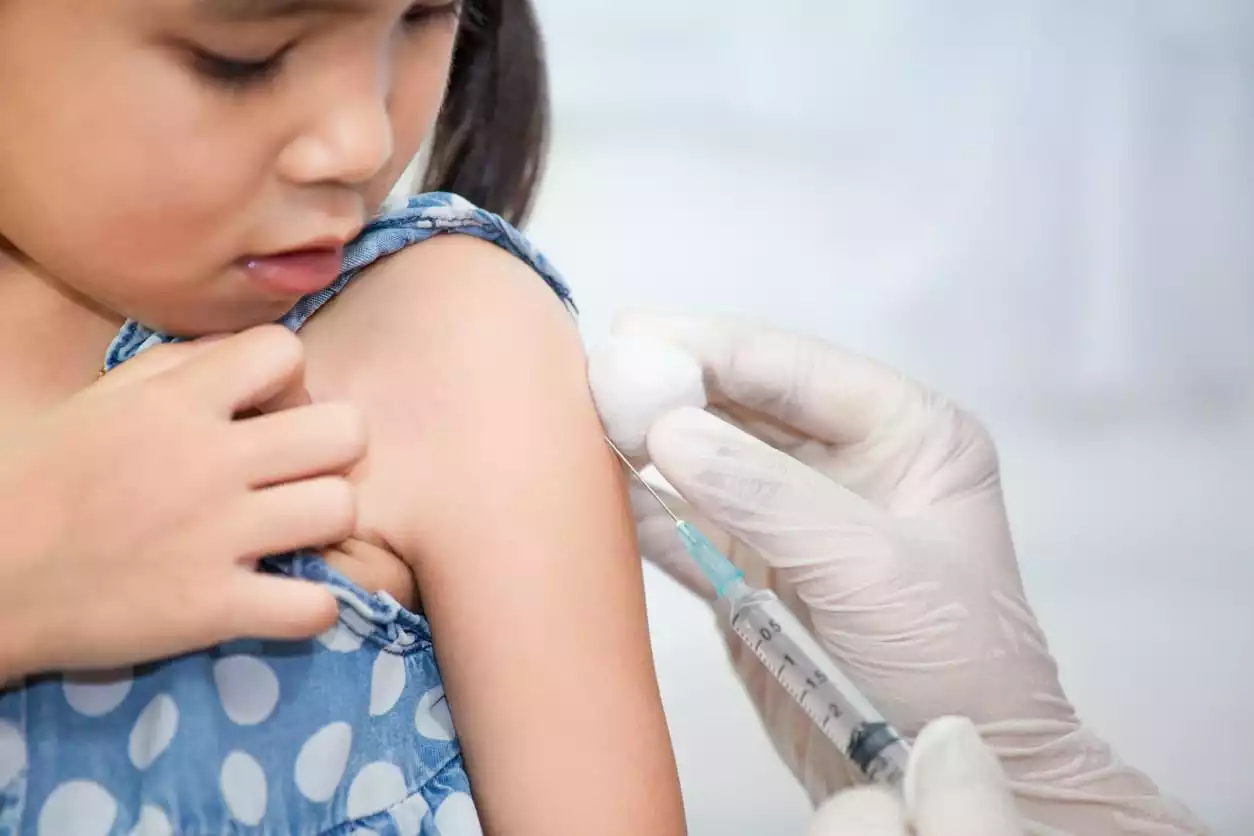
August is National Immunization Awareness Month (NIAM), and that means it’s time for us to do our part to spread awareness and information.
Vaccines are one of the most powerful tools in the world in the fight against preventable diseases, like measles, mumps, rubella, diphtheria, meningitis, and even Influenza.
Following the recommended vaccination schedule in childhood, teenagerhood, and adulthood is one of the best ways to ensure that you stay well and healthy for life.
National Immunization Awareness Month
This National Vaccine Awareness Month, our goal is to spread awareness of vaccines. We want to answer some of the most common questions surrounding them.
One of the most common questions we field in the pharmacy, especially around vaccine safety is how age factors into a patient’s vaccine schedule.
This includes when, how, and how often patients should be inoculated.
Your health status, life stage, and even lifestyle all play a role in the answer to this complicated question.
To help you better understand vaccination and whether this treatment is right for your family – or at what age to vaccinate – continue reading.
This short guide contains helpful information clarifying vaccine myths and misunderstandings, including the role age plays in inoculation, to help you make the right choice.
Vaccine Myths
A small number of Americans still turn away from vaccination altogether as a result of misconceptions surrounding safety and pharmacology.
They may think that vaccination is unsafe, that it doesn’t work, or that too many injections in a short period of time can overwhelm the body.
Or, they may feel that very young children aren’t yet able to process vaccines, and thus, injections may make them sick.
These “anti-vax” views mostly come from misapplied scientific theories rather than whole truths. They are sourced from non-professionals, come from non-credible websites, or are shared via old wives’ tales from parent-to-parent.
Anti-vaccination views may also occur as a result of misinterpreted and misapplied scientific data, especially in self-directed online research.
Patients assume that what they are reading is not only true but also reliable. Without having a medical or pharmacological degree, interpreting scientific data can be extremely confusing.
This Immunization Awareness Month, take the time to debunk these vaccination myths.
There is no shame in admitting you don’t understand vaccines or in asking for more information about vaccine safety.
Your pharmacy can address these questions for you and help to break down complex data to explain it in a way that’s easier to understand, including research, studies, and risks.
Don’t be afraid to ask questions!
The Truth About Vaccines
This National Immunization Awareness Month, we want to teach you about vaccines.
The truth is this: nearly all of the research available to us right now shows that vaccines are an overwhelmingly safe, low-risk option for fighting preventable communicable diseases like measles, chicken pox, and smallpox.
Inoculation is a significant reason why many of these older, more devastating diseases have largely disappeared.
But are complications even possible? Unfortunately, yes – but they’re extremely rare and almost never occur.
All medications, including vaccines, carry certain risks, contraindications, and complications.
This is a “risk profile”. It helps your medical providers decide whether the benefits of vaccination outweigh the risks in your individual health scenario.
When complications do occur, they are almost never a result of “vaccine injuries,” a non-specific, rarely clear term.
Instead, they mostly occur as a result of undiscovered allergies or very specific and uncommon diseases, like Guillain-Barré Syndrome (GBS) or Severe Combined Immunodeficiency (SCID).
Your doctor and pharmacy can help you determine whether or not you are truly precluded from vaccination by reviewing your health picture for a more specific answer.
Next, we’ll address vaccine concerns relating to age. This includes when to vaccinate your child and how vaccines work in adulthood.
Age and Vaccines
Does age play a role in safe inoculation? Absolutely!
In fact, the Center for Disease Control (CDC) and national organizations like the Mayo Clinic both have recommendations for when, and how often, children, teens, and adults should receive vaccinations.
This is a “vaccine schedule.”
Initial vaccines for children are recommended even before your child is born, during the prenatal period.
The CDC recommends that pregnant mothers receive at least one Influenza and Pertussis (whooping cough) vaccine before birth.
After baby comes into the world, he or she will have a series of three initial shots to protect against Hepatitis B. virus.
These shots are critical for infants because they effectively prevent potentially fatal liver disease.
From then on, your infant will follow a CDC-recommended vaccine schedule.
The Vaccine Schedule Through Adulthood
At around two months of age, the CDC, who created the National Immunization Awareness Month, recommends a long-term vaccination schedule to begin.
This schedule covers infanthood to adulthood.
- Two Months –Hepatitis B (2nd dose), Diphtheria, Tetanus, and Pertussis (DTaP), Haemophilus Influenzae type b (Hib), Polio (IPV), Pneumococcal (PCV), and Rotavirus (RV).
- 4 Months – Diphtheria, Tetanus, Pertussis (DTaP), Haemophilus Influenzae type b (Hib), Polio (IPV), Pneumococcal (PCV), Rotavirus (RV), and Hepatitis B (HepB).
- 6 Months – Diphtheria, Tetanus, Pertussis (DTaP), Haemophilus Influenzae type b (Hib), Polio (IPV), Pneumococcal (PCV), Rotavirus (RV), and Influenza (flu).
- 7 to 11 Months – No vaccines. This period may also be to “catch up” on vaccines to cover any a child still needs.
- 12 to 23 Months – Chickenpox (Varicella), Diphtheria, Tetanus, Pertussis (DTaP), Haemophilus Influenzae type b (Hib), Measles, Mumps, Rubella (MMR), Polio (IPV), Pneumococcal (PCV), Hepatitis A (HepA), Hepatitis B (HepB).
- 2 to 3 Years – No vaccines. This period may also be to “catch up” vaccines to cover any prior missed doses.
- 4 to 6 Years – Diphtheria, Tetanus, Pertussis (DTaP), Polio (IPV), Measles, Mumps and Rubella (MMR), Chickenpox (Varicella), and Influenza (flu).
- 7 to 10 Years – No specific vaccines. This period may also be for “catch up” vaccines to cover any doses. The CDC also encourages parents to consider giving the optional HPV Vaccine by age 9.
- 11 to 12 Years – HPV vaccine (if not yet given), Meningococcal Conjugate, Diphtheria, Tetanus, Pertussis (DTaP), Influenza.
- 13 to 18 Years – Meningococcal Conjugate booster, Serogroup B, Meningococcal Vaccine, Influenza. If traveling, additional vaccines may be necessary at this time.
Vaccines in Adulthood
What about vaccines for adults? The CDC has recommendations for vaccines in adulthood, too.
The most common recommended inoculations are Influenza (flu) vaccine every year as well as Diphtheria, Tetanus, Pertussis (DTaP) at regular and specific intervals.
When and how often you need these boosters depends on when you last received your initial vaccines.
Your doctor may also recommend other optional vaccines, especially if your lifestyle or your health scenario raises unique risks.
For example, additional vaccines are often necessary for people who travel internationally often, especially to high-risk countries.
Healthcare workers who are regularly exposed to sick patients also need regular vaccines.
There is no ceiling age for receiving vaccines; in fact, being vaccinated yearly for diseases like chickenpox, pneumoniae, and Influenza is especially important for older adults.
These diseases often have a more serious impact on patients over 50, carrying a higher risk for fatalities and complications.
If you have a legitimate reason to avoid vaccination, such as a contraindicated condition, you should know that vaccines still help to keep you safe.
When the vast majority of a population is vaccinated, diseases spread much more slowly, lessening the chance of exposure for non-vaccinated patients. This “herd immunity” is a critical factor in preventing epidemics and pandemic breakouts.
Conclusion
Understanding vaccines and the best vaccine schedule to keep you and your family safe is incredibly important.
This National Immunization Awareness Month, Burt’s Pharmacy is committed to helping you with all your vaccination needs.
Do you still have questions? Do not hesitate to call us for more information!

 info@burtsrx.com
info@burtsrx.com

